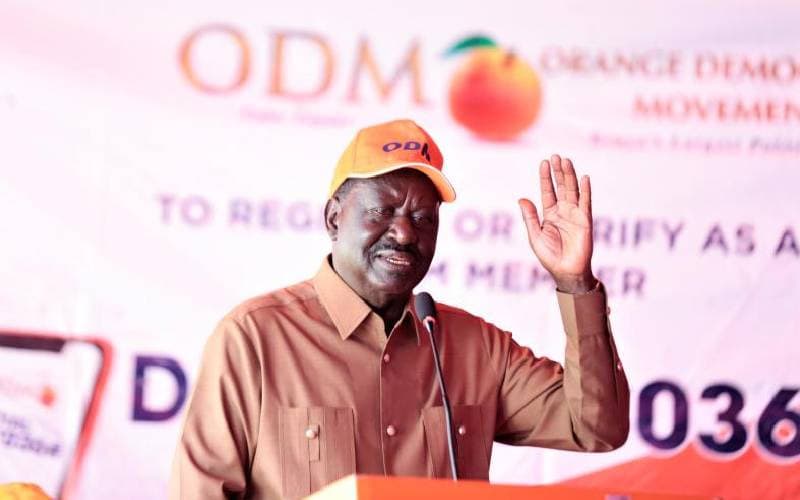We're loading the full news article for you. This includes the article content, images, author information, and related articles.
An analysis of Raila Odinga's tumultuous political journey reveals a narrative of personal sacrifice and relentless pursuit of democratic ideals that fundamentally reshaped Kenya's governance and judicial systems, leaving an indelible mark on the nation and the East African region.

Raila Amolo Odinga's political career, spanning over four decades, is a testament to an unwavering, and often painful, commitment to the fight for democracy and justice in Kenya. His lawyer, Paul Mwangi, has characterized him as a leader who, despite enduring significant electoral and legal setbacks, consistently focused on the next challenge for the nation rather than personal grievances. This resilience was cultivated through years of political detention, multiple high-stakes election campaigns, and landmark constitutional battles that have permanently altered Kenya's political landscape.
Odinga's entry into the national political consciousness was solidified through his opposition to the authoritarian regime of President Daniel arap Moi. Accused of involvement in the failed 1982 coup attempt, he was imprisoned without trial for six years, a period that transformed him into a prominent symbol of resistance. Following his release, he was detained again in 1988 and 1990 for his vocal advocacy for a multiparty political system. These years of incarceration, often in harsh conditions, cemented his reputation as a key figure in the struggle for democratic freedoms, a fight that culminated in the repeal of Section 2A of the Constitution in 1991, reintroducing multiparty politics to Kenya.
Raila Odinga contested the presidency five times: in 1997, 2007, 2013, 2017, and 2022. Each of these elections was marked by fierce competition and, frequently, allegations of electoral malpractice. The disputed 2007 election led to a devastating post-election crisis, which was resolved through a power-sharing agreement brokered by former UN Secretary-General Kofi Annan, resulting in Odinga's appointment as Kenya's second Prime Minister in 2008. This period of a grand coalition government was pivotal, leading to the promulgation of the 2010 Constitution, a landmark document that introduced a devolved system of government and strengthened democratic institutions. Odinga's persistent legal challenges to presidential election results, particularly in 2013, 2017, and 2022, have had a profound impact on Kenya's judiciary. In a historic and unprecedented decision in Africa, the Supreme Court of Kenya in 2017 annulled the presidential election, citing significant irregularities in the electoral process. This ruling was a direct result of a petition filed by Odinga and his National Super Alliance (NASA) coalition. Although his 2022 petition challenging the victory of William Ruto was dismissed by the Supreme Court, these legal battles have entrenched the role of the judiciary as a crucial arbiter of electoral disputes in Kenya.
Beyond Kenya's borders, Raila Odinga was a vocal proponent of regional integration within the East African Community (EAC). As Prime Minister, he advocated for enhanced cross-border infrastructure, trade harmonization, and greater political cooperation among member states. His support for key initiatives like the Northern Corridor Integration Projects, aimed at improving connectivity between Kenya, Uganda, Rwanda, and South Sudan, underscored his commitment to a more unified and prosperous East Africa. His stature as a Pan-Africanist was recognized through his appointment as the African Union's High Representative for Infrastructure Development from 2018 to 2023.
According to his long-time legal advisor, Paul Mwangi, Odinga's political philosophy was consistently principle-driven, even at the cost of political popularity. Mwangi highlights Odinga's intervention to save the Mau Forest as a key example of his commitment to national interests over political expediency. Despite his numerous electoral losses and the personal toll of his political battles, Odinga's career has been characterized by a remarkable ability to remain a central figure in Kenyan politics. His willingness to engage in dialogue with political rivals, most notably the 2018 "Handshake" with then-President Uhuru Kenyatta, demonstrated a pragmatic approach to easing political tensions and fostering national unity. Raila Odinga's legacy is that of a transformative, albeit polarizing, figure who, through decades of relentless struggle, fundamentally altered the democratic and judicial frameworks of Kenya. His life's work, from the cells of detention to the corridors of the Supreme Court, has left an indelible mark on the nation's political DNA, solidifying his place as one of the most consequential leaders in modern Kenyan and East African history.
Keep the conversation in one place—threads here stay linked to the story and in the forums.
Sign in to start a discussion
Start a conversation about this story and keep it linked here.
Other hot threads
E-sports and Gaming Community in Kenya
Active 9 months ago
The Role of Technology in Modern Agriculture (AgriTech)
Active 9 months ago
Popular Recreational Activities Across Counties
Active 9 months ago
Investing in Youth Sports Development Programs
Active 9 months ago
Key figures and persons of interest featured in this article